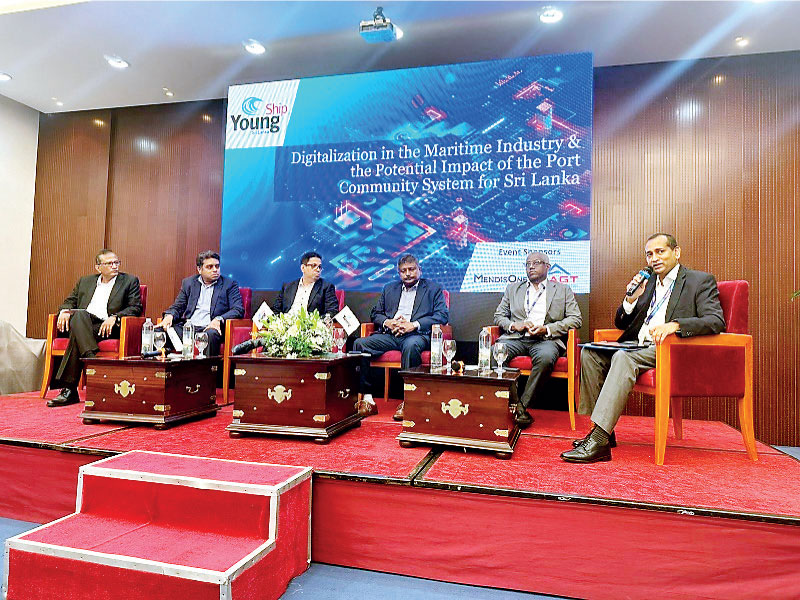Monday Feb 23, 2026
Monday Feb 23, 2026
Monday, 11 September 2023 01:21 - - {{hitsCtrl.values.hits}}

Front row (from left): YoungShip Vice Chair Nirmal Dissanayake, SLPA Addl. Managing Director Lal Weerasinghe, Sri Lanka Customs Senior Deputy Director Thilaka Pragnarate, CWIT CEO Harikrishnan Sundaram, CICT GM/Chief Information Officer Jayantha Perera, YoungShip Chairperson Maleena Awn, SAGT COO Upul Jinadasa, and CASA Doc and IT Committee Chairman Chrishantha Fernando
Back row (from left): YoungShip Executive Committee members Shane De Alwis, Aruni Wijepala, Patali Karunarathne, Shanga Jayawickreme, Sunera Wijesekara, Imaad Hameem, Prashan Fernando, and Rishantha Mendis

YoungShip Sri Lanka successfully organised a thought-provoking panel discussion on ‘Digitisation in the Maritime Industry and the Potential Impact of Port Community Systems’ recently,
The discussion was sponsored by the MendisOne Group and South Asia Gateway Terminals, garnering significant attention from industry stakeholders, experts, and maritime enthusiasts. The event took place at the Bandaranaike Memorial International Conference Hall (BMICH) Orchid Hall and served as a platform to explore the profound changes digital technologies are bringing to the maritime sector.
YoungShip Sri Lanka Chairperson Maleena Awn welcomed the gathering to explore the transformative potential of maritime digitalisation in Sri Lanka. “The maritime industry has been the backbone of global trade, and Sri Lanka intensifies its focus on becoming a maritime hub. Therefore, as we embrace technological advancements, it becomes crucial to collectively understand how digital innovations can reshape and revolutionise the way we operate within the local maritime sector,” she said.
She invited the audience to reflect on a diverse range of subjects, including the exploration of emerging digital technologies within the industry, insights into the advantages of the Port Community Systems (PCS) along with their associated implementation challenges and key success factors, comparative analysis with other ports, the implications of the IMO amendment to the FAL Convention mandating a single window for port data exchange, and a focused examination of geographic advancements and their potential effects on Sri Lanka’s maritime landscape.
The keynote address was delivered by Marcura Senior Analytics Manager Janani Yagamurthy, an eminent figure in the maritime sector nominated by the Institute of Chartered Shipbrokers Sri Lanka, on the theme ‘Maritime 4.0.’ Her insights on the importance of digitisation before digitalisation, the intersection of digital technologies for maritime operations, and the challenges and opportunities they present, set the tone for the engaging panel discussion that followed.
Furthermore, she expresses, “As we navigate towards digital transformation, we need to keep in mind that advancement requires collaboration through collective innovation and knowledge sharing. Therefore, I encourage all stakeholders in the industry to actively engage in sessions like this to explore the possibilities digitalisation offers for the upliftment of the entire maritime sector.”
Sri Lanka Ports Authority Additional Managing Director Lal Weerasinghe shed light on the proactive initiatives undertaken by SLPA to enhance productivity and efficiency within the port environment. He elaborated on the organisation’s strategies to benefit trade operations and its commitment to future initiatives aimed at aligning with global industry trends. He also discussed how the Port Community System (PCS) could be a game-changer for stakeholders, explaining its potential to improve service quality and streamline operations throughout the port. He also stressed the importance of working together to accomplish the task of implementation.
South Asia Gateway Terminals Chief Operating Officer Upul Jinadasa emphasised on understanding the opportunities Sri Lanka has due to its unique geographic advantage as a maritime hub and emphasised the need to capitalise on this positioning to enhance the port’s competitiveness within the region through improving processes and service in order to tap the throughput that is bound for countries in our region but serviced from other hub ports. He outlined the importance of strategic investments in technology and service excellence to build capacity and improve connectivity. Jinadasa’s insights painted a comprehensive picture of the port’s potential for expansion and importance in understanding the efficacy of the solutions that are being implemented.
Colombo West International Terminals CEO Harikrishnan Sundaram introduced CWIT and its many digitalisation and sustainability plans. He provided valuable insights into the initiatives that ports in the region have undertaken to embrace digital transformation. His perspective offered a glimpse into the broader regional efforts towards enhancing port operations through the integration of cutting-edge technologies. He spoke about the ample solutions available and the need for a desire by stakeholders and service providers to delve into identifying process improvements.
Colombo International Container Terminal General Manager and Chief Information Officer Jayantha Perera delved into CICT digitalisation strategies, providing a glimpse into the organisation’s roadmap for embracing emerging technologies. He also discussed the significance of the upcoming amendment to the FAL Convention, which mandates the implementation of a single window for data exchange in ports. Perera stressed the importance of cybersecurity in the maritime industry, highlighting its critical role in safeguarding sensitive data and ensuring smooth operations.
Sri Lanka Customs Senior Deputy Director Thilaka Pragnaratne outlined the modernisation and digitalisation initiatives spearheaded by Sri Lanka Customs to facilitate international trade. He elaborated on how the existing ASYCUDA system would benefit from the integration of the Port Community System (PCS), enhancing efficiency and transparency in customs procedures and further elaborated on the planned implementation of the ASYHUB system at Sri Lanka Customs which would facilitate and improve the Pre-arrival and Pre-departure processing of cargo enabling faster clearance. His insights underscored the collaborative efforts between customs and port stakeholders to streamline trade processes through digital platforms.
The panel was masterfully moderated by Ceylon Association of Shipping Agents Documentation and IT Committee Chairman Chrishantha Fernando, who elegantly fostered the desired atmosphere of knowledge-sharing that illuminated the multifaceted dimensions of digitalisation in the maritime sector. Accordingly, the success of ‘Digitalisation in the Maritime Industry and the Potential Impact of Port Community Systems’ panel discussion highlights Sri Lanka’s dedication to embracing technological advancements for a sustainable and prosperous future in the maritime industry whilst focusing on customer centricity and nurturing a collaborative approach to keep up with global digital advancements.